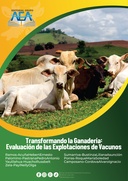Explore

Transformando la Ganadería: Evaluación de las Explotaciones de Vacunos
0 Ungluers have
Faved this Work
Login to Fave
The study was conducted in 18 districts of Huancavelica province, surveying 426 cattle producers during 2020. The producers, with a primary education level or no education at all for the most part, are mainly engaged in agriculture and cattle raising, and do not usually receive wages for their work. The main breed of cattle is Brown Swiss (37.6%), and producers keep an average of 6.5 head of cattle, with a semi-extensive production system. The main objective of cattle raising is milk production (46.9%) and dual purpose (44.1%), although most producers cannot determine the live weight of the cattle they sell. Although grazing and supplementation with common salt is practiced, pastures are not conserved for the dry season, and most producers have difficulty detecting estrus and determining the age at first service. Natural mating predominates, without genetic improvement, and there is no adequate management of diseases such as mastitis and fasciola. Producers lack equipment and machinery, do not receive adequate technical assistance and do not follow a sanitary calendar. It is concluded that management and technical assistance in areas such as reproduction, health, genetic improvement and feeding are deficient.
This book is included in DOAB.
Why read this book? Have your say.
You must be logged in to comment.
Rights Information
Are you the author or publisher of this work? If so, you can claim it as yours by registering as an Unglue.it rights holder.Downloads
This work has been downloaded 31 times via unglue.it ebook links.
- 31 - pdf (CC BY-NC-SA) at Unglue.it.
Keywords
- caracterización
- Crianza
- Sistema
- Vacunos
Links
DOI: 10.55813/egaea.l.2022.31Editions

